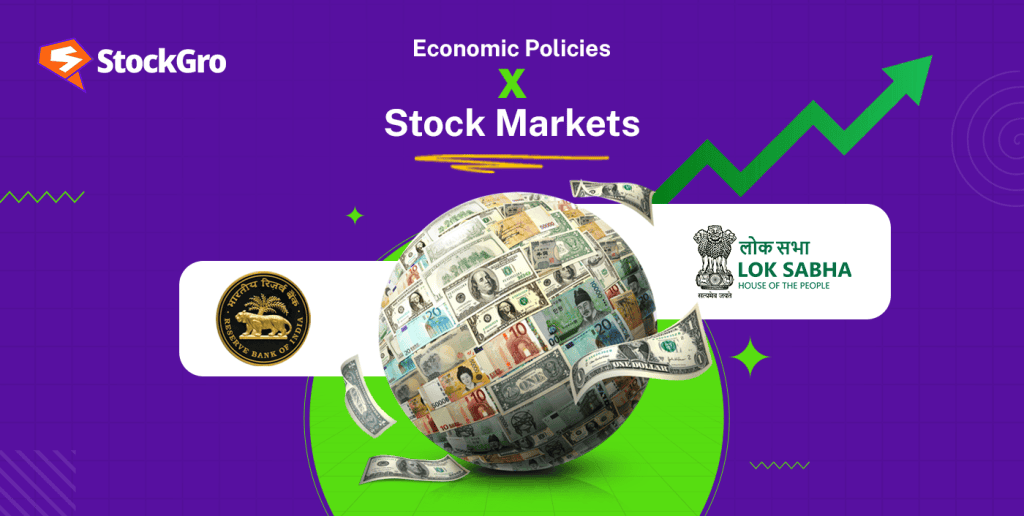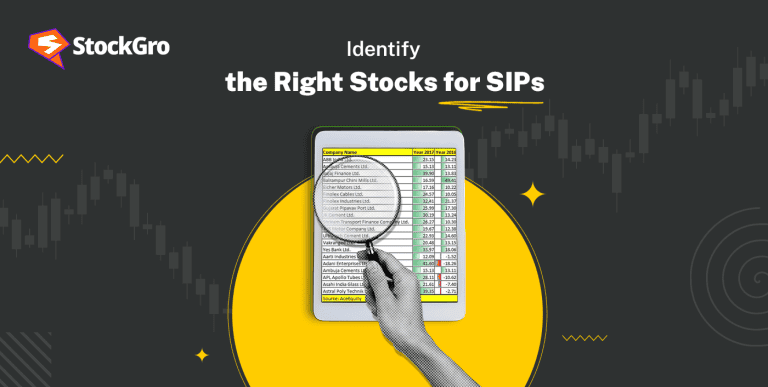
The stock markets experience enormous volatility. This volatility is often caused by domestic and international markets. A major contributor to stock market volatility is government policies, decisions and actions. The effect of government policies on the stock market may be direct or indirect. The indirect impact of economic policies is experienced when government actions or decisions cause repercussions which spark a market reaction.
Listed below is a detailed study of how various government policies affect stock markets along with current incidents of the same nature and their market impacts.
Also read: Stock Market Volatility: The Roller-Coaster Ride
Impact of economic policies by the government
The fiscal policy of a country is formulated and managed by the government of India primarily through the finance ministry. The use of taxes and expenditures by a government to affect an economy is known as fiscal policy. The effect of government policies on the stock market are listed below.
Budget
The annual budget impacts the stock market directly and indirectly by influencing the performance of stocks listed in it. It is a key occasion that unveils significant policy changes and economic improvements in India.
The expenditure objectives of the government, including capital investment in areas like infrastructure, are also included in the budget. A possible increase in stock values can result from heightened government spending in some sectors.
These expenditures can also have a good effect on linked companies, create jobs, and boost economic growth. This economic expansion on the other hand positively impacts the market.
However, economic policies of the budget may even inversely affect market performances. For instance, Increased taxes on capital gains may cause a downturn in the marketplace.
Budget 2024 and the stock market
Following were the takeaways from budget 2024 that had a strong impact on the market.
| Parameter | Before budget 2024 | After budget 2024 |
| Long Term Capital Gains (LTCG) tax rate | 10% | 12.5% |
| Short Term Capital Gains (STCG) tax rate | 15% | 20% |
| Securities Transaction Tax (STT) | 0.01% | 0.02% |
The stock market was significantly volatile after the Budget 2024. The BSE Sensex fell 73 points to close at 80,429.04 following the finance minister’s presentation of the budget. The Nifty index fell 30 points to close at 24,479.05.
Learn more: The union budget has a significant impact on the stock market. Know how!
Demonetisation
The Indian economy and stock market were significantly impacted after the 2016 demonetisation of high-value currency notes. Several sectors saw a decline in sales and profits as a result of the action, which momentarily decreased consumer spending power. As a result, the impacted stock values decreased.
Impact on the stock market
The Sensex plummeted by 1,688.69 points (6.12%) to go below the critical 26,000 mark and closed at 25,902.45. All sectoral indexes, with real estate, consumer durables, and autos leading the way, fell as much as 10.78%. The government’s decision to remove bigger denomination notes caused the Nifty to plummet by more than 541 points.
Effect of RBI’s economic policies
The Reserve Bank of India primarily formulates and oversees the monetary policy of the country by impacting the supply of money and fiscal policy through open market operations, interest rates and much more.
Repo rate
The rate at which banks pledge their securities to the RBI to borrow money is known as the repo rate. Lending rates and banks’ cost of borrowing are both impacted by changes in the repo rate.
When the repo rate increases, the cost of borrowing goes up, resulting in an absorption of liquidity from the market. Banks reduce deposit interest and increase loan interest, reducing the money supply to common people. It caused a fall in stock market investment. The opposite holds when the repo rate is reduced.
Learn more: Analysing the impact of RBI’s monetary policy on the Indian stock market.
Impact on the stock market
Following the decisions of the RBI MPC meeting, the Indian stock market saw a significant upswing. Investors were happily surprised when RBI Governor Shaktikanta Das maintained the repo rate at 6.50%.
Reverse repo rate
The interest rate that the RBI charges banks for their temporary holdings of excess cash is known as the reverse repo rate.
Although reverse repo is always lower than the repo rate, an increase in reverse repo rate can increase money supply and liquidity, thereby promoting more stock market investment. The reverse holds when the reverse repo is decreased.
Election and stock market
Elections have a strong impact on the economic policies of the country and thus the stock market. Historically every Lok Sabha election has caused a market surge or a downfall. There might be various factors for it. For instance- the return of an incumbent government is usually met with good market performance because traders expect policy continuation.
Impact on the stock market
The Indian stock market anticipated policy continuity going into the 2024 Lok Sabha election season. Uncertainties about the low voting participation caused the domestic stocks to experience increased volatility. At 3 p.m. of the result day, the Nifty was down 1,451.10 points, or 6.24%, at 21,812.80, while the Sensex plummeted by 4,531.36 points, or 5.93%, at 71,937.42.
Also read: Unravelling the mystery: Why is the stock market crashing before elections?
Conclusion
The volatility of the stock market is entangled with the economic policies of the government and the prevailing political conditions of the country. Not only the domestic government but also certain geo-political events shape the performance of the markets and the economy in general.
The stock market is the pulse of an economy that helps to check the health of the economy. Events like elections and budgets are commonly paired with market upturns or downturns. A thorough understanding of the effects of government policies on the stock market enables investors to make prudent decisions.
FAQs
- How do the government policies affect the extent of the market?
The government affects the stock market through monetary and fiscal policy. The monetary policy is set by the RBI while the fiscal policy is set by the government of India. The various modifications to tax laws on capital gains and corporations cause direct stock market reactions. The monetary policies of the RBI affect the liquidity of the economy. Thereby causing stock market movements.
- How does government policy affect investment?
Both fiscal and monetary policies affect investment by targeting liquidity. If liquidity increases in the economy the disposable income in the hands of individuals rises leading to an upswing in the stock markets. Moreover, companies tend to invest more in such situations. Similarly, when liquidity is withdrawn people make fewer investments and companies shy away from expansion.
- How does fiscal policy affect the stock market?
The fiscal policy of the government can impact the stock market in multiple ways. An increase in capital gains taxes demotivates investors and discourages stock market investment. The opposite occurs when capital gains taxes are reduced. Moreover, if government policy discourages certain commodities, stocks which deal with such commodities are adversely affected.
- Do local elections affect the economy?
State elections may or may not impact markets since state policies rarely impact the functioning of stock markets. However, central elections have systematically influenced stock market performances. For instance, at 3 p.m. of the 2024 Lok Sabha election result day, the Nifty was down 1,451.10 points, or 6.24%, at 21,812.80, while the Sensex plummeted by 4,531.36 points, or 5.93%, at 71,937.42.
- Do international events affect the economy?
Yes, international events often impact the Indian markets. For instance, global money is drawn to U.S. bonds with higher returns. This causes outflows from developing nations like India. Stock prices and general market sentiment are impacted as a result of this decreased liquidity.

